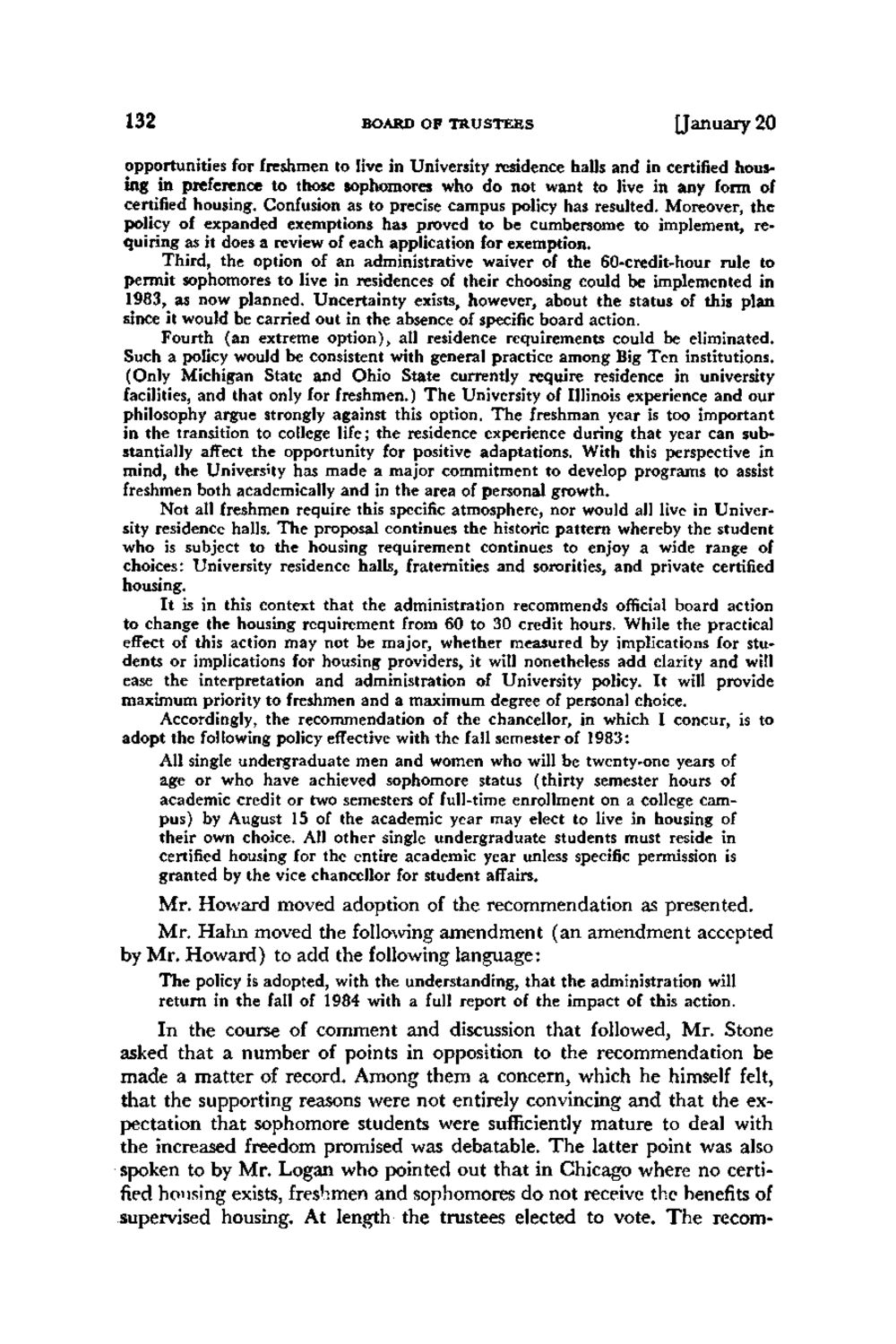| |
| |
Caption: Board of Trustees Minutes - 1984
This is a reduced-resolution page image for fast online browsing.

EXTRACTED TEXT FROM PAGE:
132 BOARD OF TRUSTEES [January 20 opportunities for freshmen to live in University residence halls and in certified housing in preference to those sophomores who do not want to live in any form of certified housing. Confusion as to precise campus policy has resulted. Moreover, the policy of expanded exemptions has proved to be cumbersome to implement, requiring as it does a review of each application for exemption. Third, the option of an administrative waiver of the 60-credit-hour rule to permit sophomores to live in residences of their choosing could be implemented in 1983, as now planned. Uncertainty exists, however, about the status of this plan since it would be carried out in the absence of specific board action. Fourth (an extreme option), all residence requirements could be eliminated. Such a policy would be consistent with general practice among Big Ten institutions. (Only Michigan State and Ohio State currently require residence in university facilities, and that only for freshmen.) T h e University of Illinois experience and our philosophy argue strongly against this option. T h e freshman year is too important in the transition to college life; the residence experience during that year can substantially affect the opportunity for positive adaptations. With this perspective in mind, the University has made a major commitment to develop programs to assist freshmen both academically and in the area of personal growth. Not all freshmen require this specific atmosphere, nor would all live in University residence halls. T h e proposal continues the historic pattern whereby the student who is subject to the housing requirement continues to enjoy a wide range of choices: University residence halls, fraternities and sororities, and private certified housing. It is in this context that the administration recommends official board action to change the housing requirement from 60 to 30 credit hours. While the practical effect of this action may not be major, whether measured by implications for students or implications for housing providers, it will nonetheless add clarity and will ease the interpretation and administration of University policy. It will provide maximum priority to freshmen and a maximum degree of personal choice. Accordingly, the recommendation of the chancellor, in which I concur, is to adopt the following policy effective with the fall semester of 1983: All single undergraduate men and women who will be twenty-one years of age or who have achieved sophomore status (thirty semester hours of academic credit or two semesters of full-time enrollment on a college campus) by August 15 of the academic year may elect to live in housing of their own choice. All other single undergraduate students must reside in certified housing for the entire academic year unless specific permission is granted by the vice chancellor for student affairs. M r . H o w a r d moved adoption of the recommendation as presented. M r . H a h n moved the following a m e n d m e n t (an amendment accepted by M r . H o w a r d ) to add the following language: T h e policy is adopted, with the understanding, that the administration will return in the fall of 1984 with a full report of the impact of this action. I n the course of comment and discussion that followed, M r . Stone asked t h a t a number of points in opposition to the recommendation be m a d e a m a t t e r of record. Among them a concern, which he himself felt, that the supporting reasons were not entirely convincing and that the expectation t h a t sophomore students were sufficiently mature to deal with the increased freedom promised was debatable. T h e latter point was also spoken to by M r . Logan who pointed out t h a t in Chicago where no certified housing exists, freshmen and sophomores do not receive the benefits of supervised housing. At length the trustees elected to vote. T h e recom-
| |